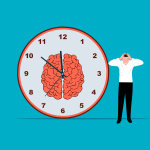Can I Take Xanax While on HRT?

Xanax (alprazolam) and hormone replacement therapy (HRT) are two different types of medications that are often prescribed for different conditions. Xanax is a medication that is primarily used to treat anxiety and panic disorders, while HRT is used to alleviate symptoms of menopause and other hormonal imbalances.
However, it is possible for individuals to be prescribed both Xanax and HRT at the same time. In this article, we will discuss the potential risks and benefits of taking Xanax and HRT together.
What is Xanax?
Xanax is a type of benzodiazepine medication that is used to treat anxiety and panic disorders. Benzodiazepines work by enhancing the effects of a neurotransmitter called gamma-aminobutyric acid (GABA) in the brain, which helps to reduce anxiety and promote relaxation. Xanax is a short-acting benzodiazepine, which means that its effects typically last for a few hours.
Xanax is one of the most commonly prescribed medications in the United States. According to the Substance Abuse and Mental Health Services Administration (SAMHSA), in 2018, there were approximately 11.2 million people aged 12 or older who misused prescription benzodiazepines, including Xanax. This represents approximately 4.2% of the population in that age group. Additionally, a study published in the Journal of Psychiatric Services in 2016 found that Xanax was the third most commonly prescribed psychiatric medication in the United States, after sertraline (Zoloft) and fluoxetine (Prozac). However, it is important to note that these figures are based on data from a few years ago, and may not reflect current trends in Xanax use.
Can Xanax Be Prescribed To Ease Menopausal Symptoms?
Yes, Xanax can be prescribed for menopausal women experiencing symptoms such as anxiety, insomnia, mood changes, and irritability, which are also common indications for Xanax use.
Xanax by enhancing the activity of a neurotransmitter called gamma-aminobutyric acid (GABA) in the brain. GABA helps to reduce the activity of nerve cells in the brain, resulting in a calming and sedative effect. This makes Xanax an effective medication for treating anxiety disorders, panic disorders, and other conditions that cause excessive worry or nervousness.
During menopause, the levels of estrogen and other hormones in a woman’s body decline, which can lead to a range of physical and emotional symptoms. For some women, these symptoms can be severe and affect their quality of life. Xanax may be prescribed by a healthcare provider to help manage symptoms such as anxiety, insomnia, and mood changes that are associated with menopause.
What is HRT?
HRT stands for hormone replacement therapy. It is a type of medication that is used to alleviate symptoms of menopause, such as hot flashes, night sweats, and vaginal dryness. HRT works by replacing the hormones that the body no longer produces after menopause. The specific hormones and drugs used in HRT depend on the individual’s medical needs and goals, with estrogen and progestin commonly used for menopausal HRT, and estrogen, anti-androgens, and testosterone for gender-affirming HRT.
According to a study published in the journal Menopause in 2020, it is estimated that approximately 45% of menopausal women in the United States use some form of HRT. This number has been declining in recent years due to concerns about the potential risks associated with HRT, including an increased risk of breast cancer, blood clots, and stroke. However, HRT can still be an effective treatment for menopause symptoms for some women, and it is important to speak with a healthcare provider to determine if it is an appropriate treatment option for each individual.
Can I take Xanax and HRT Together?
There are several potential risks associated with taking Xanax and HRT together, for example Xanax may potentially slow down the excretion of estradiol, a type of estrogen hormone, which could lead to an elevation in serum levels.. One of the main risks is the potential for drug interactions. Xanax can interact with a variety of medications, including HRT. Taking Xanax and HRT together may increase the risk of side effects, such as dizziness, confusion, and difficulty concentrating. In addition, HRT (estrogen) can affect the way that Xanax is metabolized in the body, potentially altering its effectiveness and increasing the risk of side effects.
Another potential risk of taking Xanax and HRT together is the potential for addiction. Xanax is a highly addictive medication, and taking it for an extended period of time can lead to physical and psychological dependence. HRT is not typically associated with addiction, but taking Xanax and HRT together may increase the risk of developing an addiction to Xanax.
Finally, taking Xanax and HRT together may increase the risk of certain health problems. For example, both Xanax and HRT are associated with an increased risk of blood clots, which can lead to serious health problems such as stroke or pulmonary embolism. Combining these medications may increase the risk of blood clots even further.
Consulting a Healthcare Professional
The question of whether it is safe to take Xanax while on HRT is not one that can be answered definitively without taking individual factors into account. It is crucial to consult with a qualified healthcare professional, such as a doctor or healthcare provider, who is familiar with your medical history and specific needs. Here are some important factors to consider when discussing these two treatments with your healthcare provider:
1. Individual Health: Your overall health, any preexisting medical conditions, and any potential drug interactions are essential factors to consider. Your healthcare provider can assess your medical history to determine the safety and appropriateness of combining Xanax with HRT.
2. Medication Interactions: Different medications can interact with one another, potentially affecting their effectiveness or causing unwanted side effects. Your healthcare provider can evaluate any potential interactions between Xanax and your HRT regimen.
3. Anxiety Management: If you are considering taking Xanax to manage anxiety while on HRT, it’s important to discuss your specific anxiety symptoms and the benefits and risks of this approach with your healthcare provider.
4. Mental Health Care: If you have underlying mental health conditions that require medication, your healthcare provider can guide you on the best course of action, which may include a combination of treatments tailored to your needs.
5. Monitoring and Adjustments: If your healthcare provider determines that it is safe and appropriate to use Xanax while on HRT, they will provide guidance on the correct dosage and how to monitor your response to the treatment. Adjustments may be necessary over time.
Self-Medication and Risks
It’s crucial to emphasize that self-medication or making changes to your medication regimen without consulting a healthcare professional is not advisable. Both HRT and Xanax are powerful medications with potential side effects and interactions, and their use should be closely monitored by a qualified healthcare provider. Making decisions about your healthcare without professional guidance can lead to health risks and complications.
Conclusion
The question of whether you can take Xanax while on Hormone Replacement Therapy is a complex one that requires careful consideration and expert guidance. While some individuals may safely use Xanax to manage anxiety while on HRT, it is essential to consult with a healthcare professional to assess your individual health, medication interactions, and specific needs.
Your healthcare provider can provide personalized advice and create a treatment plan that best addresses your health concerns and ensures your well-being. Do not hesitate to reach out to your healthcare professional to discuss your situation and receive the guidance and support you need to make informed decisions about your healthcare.





